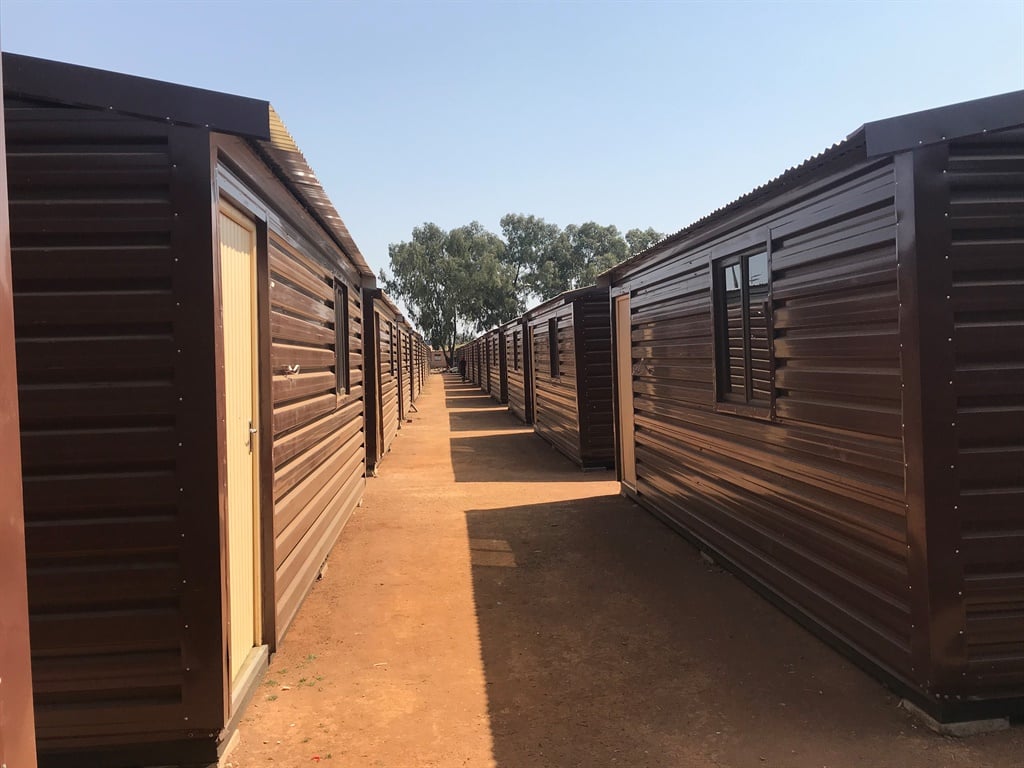
- About 1 000 temporary shelters were meant to be completed at the overcrowded Mamelodi hostels in Tshwane by the end of June.
- This deadline was missed due to a steel shortage and a second deadline of end of September was also missed due to other delays.
- The delays included community disruptions, strikes and unsatisfactory performance by contractors.
The construction of temporary residential units (TRUs) meant to, in part, ease congestion at Mamelodi hostels to ease overcrowding to contain the spread of Covid-19, has still not been completed - and a second deadline has been missed.
In May this year, News24 reported that about 1 000 TRUs would be built by the end of June to alleviate overcrowding at the hostels, which house around 10 000 people by accommodating, on average, 16 people per room.
When News24 visited the hostels at the end of August, it became clear that most of the TRUs had not been completed and those that were finished were unoccupied.
At the time, the Housing Development Agency (HDA) said that 178 units had been completed and that delays were attributed a national shortage of steel during the lockdown.
The HDA then set a second deadline for the project in terms of which it had to be completed by the end of September 2020, if there were no unforeseen delays.
Second deadline missed
But, earlier this month, when News24 revisited the hostels, construction had still not been completed and not a single hostel dweller had moved in.
HDA spokesperson Tshepo Nkosi said the latest delays were due to community disruptions, labourer strikes, work stoppages, and unsatisfactory contractor performance.
Nkosi said the project team was closely monitoring the performance of contractors.
Nkosi said:
By 10 November, 593 foundations and 494 wall plates had been laid and installed, while 417 TRUs had been roofed and 223 units had been completed.
"Other milestones in progress include, but [are] not limited to installation of frames and doors, installation of windows, installation of vinyl flooring, installation of electrical fittings, partitioning and painting works. These milestones are in progress and at different stages."
Nkosi added that the City of Tshwane was busy with the occupation process and engagements with future beneficiaries.
City of Tshwane spokesperson Lindela Mashigo told News24 that the completed units could not yet be allocated because there were no occupation certificates yet.
In the interim, electricity connections for completed units have been installed and will be connected once the electricity accounts are opened with the electricity department.
The City also hit a snag brought about by old infrastructure in the other parts of the area and was investigating how to install the infrastructure and source funds for this purpose, Mashigo added.
TRU purposes and Covid-19
According to the HDA, the TRUs, which cost R64 000 per unit, were meant to serve three purposes:
1. To ease congestion at the densely populated hostels and informal settlements in order to contain the spread of Covid-19.
2. To temporarily decongest densely populated settlements and to afford beneficiaries of RDP homes, decent living conditions while they waited for their houses to be completed.
3. To serve as emergency housing where required - communities affected by floods, fires or sinkholes.
When previously asked if the TRUs failed to meet their purpose, the HDA said the Covid-19 pandemic was not over and that the TRUs would continue to be used to decongest densely populated settlements and hostels while permanent solutions were pursued.
"There is no cure in South Africa to date. Government's approach to Covid-19 remains the same as March 2020. There is a great risk of resurgence of Covid-19 if we take off the foot on the [pedal]," the HDA said at the time.
Mashigo said:
Given the old infrastructure, the nature and overcrowding of the hostels and the close proximity in which people live, it is critical that the hostel is decanted to ensure more appropriate physical distances between the residents.
Hostel history
The Mamelodi hostels were built by the City Council of Pretoria in the early 1960s. They consisted of 19 blocks, predominantly accommodating single men.
Since the inception of democracy in 1994, women and children also moved in and now occupy parts of the hostel.
Do you want to know more about this topic? Sign up for one of News24's 33 newsletters to receive the information you want in your inbox. Special newsletters are available to subscribers.
